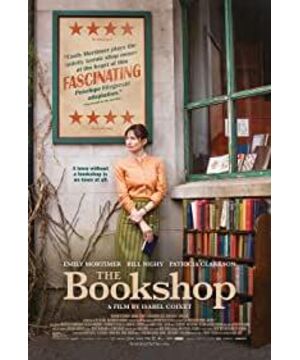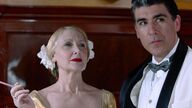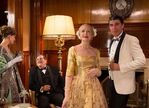When I first saw the title of the movie "Bookstore" , I thought it was a literary film full of literary atmosphere and heart-warming.
In this impetuous era, extremely scholarly films coincide with the increasingly sought-after "reading is our closest moment to beauty" and "a moment of tranquility in the hustle and bustle".
And people who like to read will be attracted to the movie at the first time.
Of course goose.
Movies are not what we think they are.
Don't be fooled by its small and fresh poster-
Because the story of the movie can be summed up as-
"Murder caused by a bookstore".
And this lady, whose face is full of dignified, elegant, noble and virtuous words , actually hides a huge conspiracy behind her smile.
Does it sound terrifying?
Don't worry, the more you look behind, the more you will feel that the worldview collapses, it's just a momentary thing...
In 1959, Harburg, a closed and backward town surrounded by the sea in England.
The heroine Florence Green , the widow of World War II, is an independent and strong woman.
She lost her husband, had no children, and lived alone in a small town.
She has loved reading since she was a child, and she met her husband in a bookstore in London.
She often walks by the sea, sorting out her thoughts and ideas after reading.
And firmly believe that books are like a home, which can change lives and endow human beings with a beautiful heart.
Reading, walking, and widowhood, Florence thought suddenly,
Why can't I open a bookstore in a small town?
Despite this closed town, residents generally do not have the habit of reading.
As a boatman said to Florence,
"Reading makes me tired, but life is enough for me."
The boatman commented that Florence's idea of opening a bookstore was very bold, because the only person in the small town of Harburg who had the habit of reading was the eccentric old man who lived alone who would never leave his house: Brandish .
Florence's resistance to opening a bookstore goes far beyond that.
The bank manager refused to lend her a loan because he could not see the potential of the bookstore to make money.
But Florence is a strong and uncompromising woman, and what she believes must be done.
In order to save money, she bought an old house in the town that had been idle for many years.
The plumbing in the house is broken, birds are nesting, the roof is half-collapsed, and there is a stench of mouse droppings.
But under the careful arrangement of Florence, the bookstore opened soon, and Florence gave the bookstore a name that matched the temperament of the house - "Old House Bookstore" .
Don't forget, her town is a small and closed place.
The fastest speed is not the plane floating in the sky, but the speed of the news .
News of Florence's opening of the bookstore soon spread throughout the town.
Gradually, in everyone's ambiguous smiles, Florence felt the exclusion and hostility she suffered .
Indeed, in a rigidly conservative town, residents are instinctively wary of any "intruder" that interferes with their habitual lives.
Especially when this "intruder" has offended someone who shouldn't have offended!
This person who should not be offended is the lady with a mysterious smile mentioned above—
Mrs Garmat.
Lady Gamart invites Florence to a banquet hosted by her family.
At the banquet, she suggested to Florence, half-threateningly, half-coercively, that she could find a new store to open a bookstore in a more suitable place, but she was categorically rejected by Florence.
This seemingly simple refusal directly triggered a series of subsequent vicious events:
Relevant law enforcement officers ordered the bookstore to immediately stop sales due to the traffic congestion caused by a book called "Lolita";
The only "employee" little girl Christine was targeted by the inspectors of the Ministry of Education, and she could no longer continue to help in the bookstore because of the "illegal work of minors";
Coincidentally, another bookstore opened on the same street, which seriously affected the operating income of the "Old House Bookstore";
The most deadly thing is that a member of the parliament submitted a bill on the government property of the old house. Once the bill is passed, Florence's old house will be reverted to the government.
And if it can be proved that the old house is in disrepair, she will not even get any compensation from the government.
Does this nakedly drive people to death?
And all of this was manipulated by Mrs. Garmat, the "Laughing Tiger" .
The proponent of the "Fatal Strike Act" was Mrs. Garmat's nephew .
How could Florence, who was alone, resist this series of critical attacks?
At the end of the story, she can only choose to surrender to fate.
After reluctantly selling the bookstore, he left the town sadly.
And at the end of the film, everyone in the town watched Florence's expression, forming a silent ill will.
This reminds me of the "poor hills and bad waters make troublesome people" .
It is exactly the same as the village of villains in Kate Winslet's "The Tailor" and the hometown of the rabble in the Spanish film "Outstanding Citizens."
And the biggest behind-the-scenes mastermind, Mrs. Gamart , even blatantly committed evil under the false face of upholding justice for the people.
Although it is not a murder and arson, it is enough to make people hate it.
These dark and unbearable aspects of human nature run through the entire film.
People can't help but sigh, isn't there a trace of beauty in human nature?
Those who have carefully tasted the film still found that the two characters appearing around the heroine are obviously completely different from those "tricksters".
One is the strange old man Blandish who just guards his old house and never leaves the house.
He ignored the rumors from the townspeople about the reason for his celibacy, and just hid at home all day reading books.
Brandish hates outsiders as much as he loves books. He even tore off the cover of the book with the author's photo and burned it.
Just such an odd-looking old man, but because of the book, he became attached to Florence.
Florence recommended a new book for him, science fiction master Ray Bradbury's novel "Fahrenheit 451" published in 1953, and also brought him the newly published popular novel "Lolita", soliciting Whether he can buy in large quantities to sell.
Through Florence's recommendation, Brandish was impressed by her reading taste, feeling that she had found a soulmate in a closed and conservative town, and made an exception to invite Florence to be a guest in her old house.
In the end, because of the fact that Florence was being excluded and suppressed, Brondig did not hesitate to break the rules that she had followed for decades, and took the initiative to find Mrs. Garmart's house and asked the other party to let Florence go.
It is also very touching to break the principle of persevering for a lifetime for the best friend whom we have rarely met in our life.…
The other is the little girl Christine.
She used her spare time to work in the "Old House Bookstore".
When they first met, in order to get Florence to hire herself, Christine introduced herself, explained the pros and cons, and refuted doubts. In an instant, the image of a quirky, decisive and brave little girl appeared in front of the audience.
Kristin speaks innocently. Although she works in a bookstore, she has confessed to Florence many times that she does not like to read.
When she saw a Chinese lacquer plate in Florence's house, Christine said directly to Florence, "I like this plate very much, you can leave it to me in your will!"
Such straightforward and unscrupulous words made Florence helpless and funny, but she also fell in love with Christine from the bottom of her heart, and often tutored her in her homework, and kept trying to guide her to like reading.
Florence was kicked out of the town and left in a lonely boat.
Others are either indifferent or watching jokes.
Only the little girl Christine, holding the novel "Hurricane in Jamaica" that Florence had recommended her to read, ran to the pier panting to say goodbye.
After seeing this, I found out that the woman who was influenced by Florence and fell in love with reading, echoing before and after the opening and ending, was the little girl Christine.
"Many years later, I still remember the smile on her face when she saw the book in my hand."
These two characters, the old and the young , became attached to Florence because of the book, and experienced the beauty of human nature with each other.
In the film, there are many scenes where the characters in the play are reading attentively.
In the darkness of despicable human nature, the film is rarely filled with a faint scholarly fragrance, which is quiet and long.
The collapse of the world view is indeed a momentary thing.
However, as Bonnie in "Wonderful Flowers" questioned:
There are a lot of bitter people in my heart, how much sweetness does it take to fill them up?
Ma Dong retorted:
You are wrong, there are a lot of bitter people in your heart, just a little bit of sweetness can fill them up.
Therefore, if the world view has been eroded by too many dark sides, and only a little bit of the beauty of human nature can be felt, you can return to the sunshine again.
View more about The Bookshop reviews











